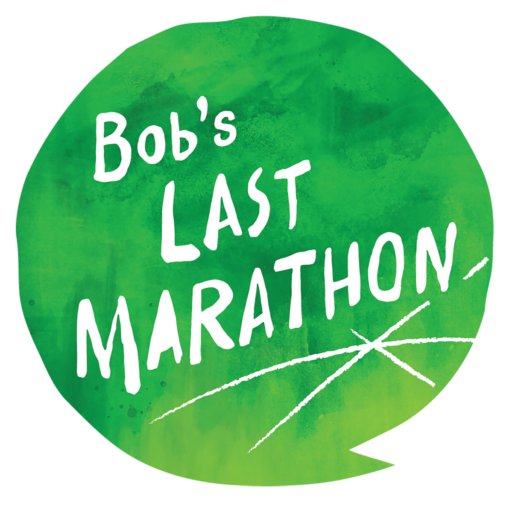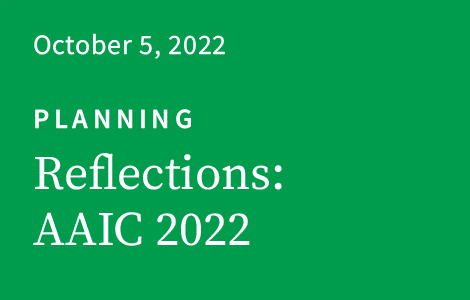Transcript
Reflections: AAIC 2022
AAIC 2022, the Alzheimer’s Association International Conference, drew more than 9,000 scientists and featured more than 4,000 presentations in person in San Diego, CA, and online around the world. As Director of Caregiver Support Services for the Massachusetts General Hospital Frontotemporal Disorders Unit, I was attending as a professional in the field. This lens made me feel energized as I scanned the program and saw so many opportunities to connect with leaders around the world. And as I walked into the opening plenary with thousands of attendees, I felt a wave of gratitude wash over me. I am a former caregiver to my late husband, who lived with frontotemporal dementia, and a current caregiver to my father, who has been living with Alzheimer’s disease for 13 years. The rush of grateful emotion was for those who do what I can’t. They are the scientists who have dedicated their professional lives to uncovering the mysteries of dementia. Many speakers at that first plenary, and throughout the five days of conference activities, shared their own lived experiences as caregivers. They talked about loving and losing people in their own lives. They spoke through deep grief lifted with tenacity and determination. Their fierceness gave me hope that we won’t stop until a cure is realized.
My role as a presenter at AAIC was to shine a light on one of the most complex aspects of care and support, advanced care planning. Courage in Care Planning: Advanced Care Planning Readiness in the Context of COVID-19 for Caregivers of Individuals Living with Dementia was both a scientific poster and an oral presentation. Through a grant funded by the National Institute on Aging, our team in the MGH FTD Unit is conducting a study about the utility of video decision aids for advanced care planning, and the work we presented at the AAIC highlighted a sub-study with caregivers of individuals living with dementia during some of the hardest days of the pandemic, when many communities were in lockdown and the vaccine was not yet available. Forty-six caregivers completed online surveys, watched educational videos about COVID-19 and advanced care planning, and participated in study sessions one day, one week, and one month after viewing the videos.
Participants completed the Advanced Care Planning (ACP) Engagement Survey before and after the intervention—which included watching videos and participating in the study sessions. After the intervention, about one third of total (N=46) participants increased their scores about ACP knowledge, thoughts, plans, and readiness to be a substitute decision-maker or to make decisions for their loved one if they became very sick.
I was humbled by the bravery with which caregivers answered one question in particular: “How ready are you to discuss with your loved one’s doctor whether or not there are certain health situations that would make your loved one’s life not worth living?” Seventy-four percent of participants increased their engagement score immediately after the intervention, showing that educational materials about the topic could help them feel more prepared to face this situation. Overall, 57 percent reported that they engaged in ACP conversations after the intervention.
Why does this matter?
Today, we don’t have a treatment to slow or stop the progression of Alzheimer’s disease. Dementia cannot yet be undone. High-quality care is about dignity and personhood at every stage. It honors cultural values and wishes for goals of care at the end of life. By talking about these difficult topics ahead of time, caregivers are more likely to feel as though they have done what their loved ones would have wanted at a time when they will likely be unable to speak for themselves. Empowerment can happen through education. Our team is continuing to study how and when caregivers and families would benefit most from this education.
There was a heightened focus on the social determinants of health and their potential impact to increase or reduce the risk of dementia. In a pre-conference workshop, Addressing Dementia Risk Through Social Determinants of Health, Craig Thomas, CDC Director, Division of Population Health Centers, highlighted loneliness as a public health threat and social connectedness as the strategy to fight against it. He said that loneliness is a health risk that rivals smoking, obesity, and physical inactivity, and it is a serious public health issue. Human beings are social by nature, and high-quality social relationships are vital for health and well-being. As a professional in the field, and a caregiver myself, this got my attention.
We know that loneliness is something that many caregivers and people living with a diagnosis of dementia struggle with. Dementia presents challenges to communication, it changes the dynamics of relationships, and it makes the logistics of travel, being out in public, and navigating everyday experiences like grocery shopping or eating in a restaurant difficult. These challenges may promote loneliness for individuals living in the greater dementia community.
We also know that there are strategies to combat loneliness and protect your health and your future. Today we do not yet have a cure for dementia, but we do have care for those living life with a diagnosis and their caregivers. For me, the way to turn inspiration into action is through connection. I think that is why it is so critical that we continue to come together. Whether we are caregivers attending a support group or scientists in a lab, the power of connection is undeniable.
No one person on his or her own can care for an individual living with dementia. In the same way, the cure for Alzheimer’s disease will not be discovered by one scientist or even one organization. This makes it even more critical that everyone in our community be connected. During a workshop on research engagement, we were reminded that you can’t manage what you don’t measure. Our research community is called to a commitment for inclusion, to make sure that studies are accessible and culturally appropriate for all racial, ethnic, geographic, and socioeconomic groups. This will allow for a full understanding about our risk of developing dementia and meaningful strategies to provide treatment, care, and support.
Our scientific community knows that the world is waiting for a cure. AAIC showcases the dedication of the worldwide efforts to move us in the right direction for risk reduction, more accurate diagnosis, treatment, and a cure. If you are a person living with a diagnosis or a caregiver who is interested in learning more, go to www.ALZ.org/aaic to read about this year’s conference. Consider attending the 2023 conference in person or online July 16–20, 2023. Complex solutions require the inclusion of all voices. Be a part of the chorus, the rallying cry, that we must move faster toward the care that families need today and the cure that we demand for tomorrow.
Katie Brandt
Director of Caregiver Support Services and Public Relations
Massachusetts General Hospital Frontotemporal Disorders Unit

